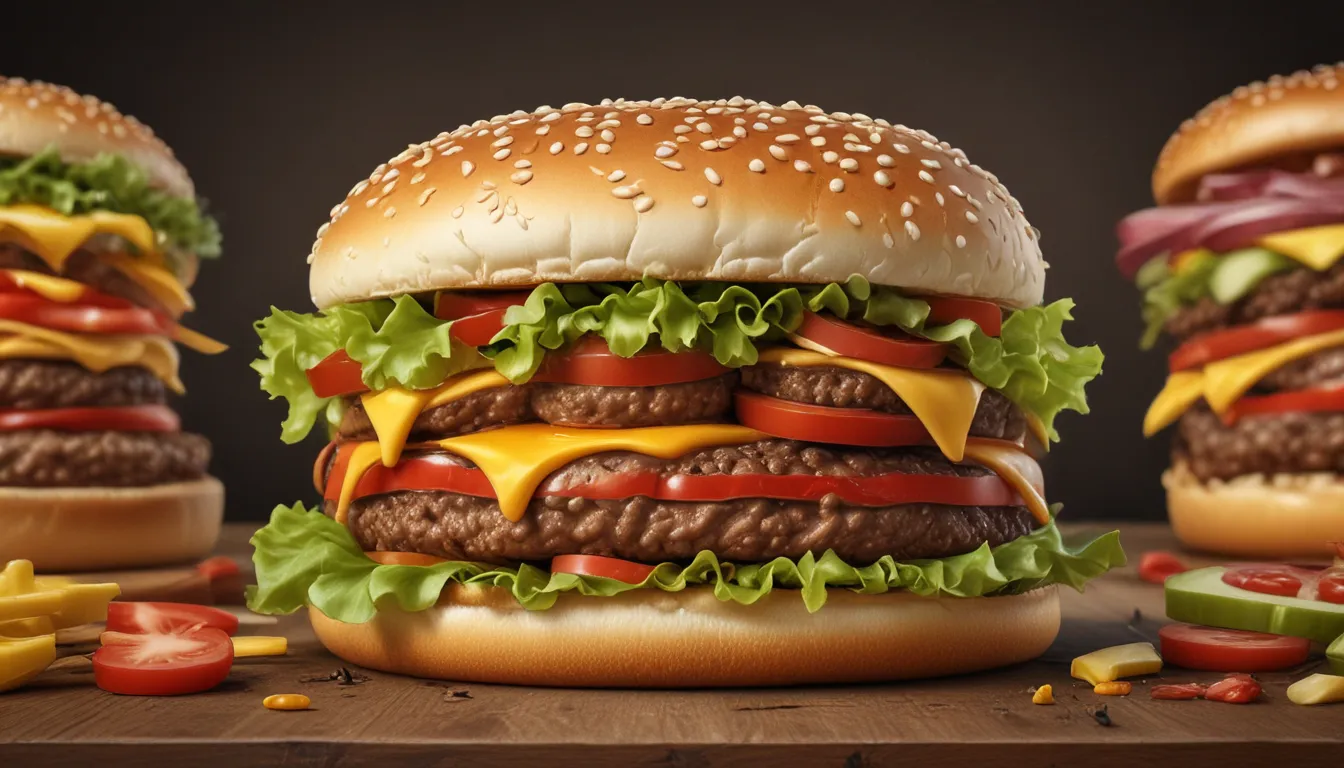The pictures in our articles might not always show exactly what the text is talking about. We use these images to make the article more interesting and eye-catching. They are there to add to the text, but not to replace it or show every detail.
If you're a fan of cheeseburgers, you're not alone! These juicy, cheesy delights have a special place in the hearts and stomachs of many. But while they may be delicious, it's important to be mindful of their nutrition facts. In this comprehensive guide, we'll delve into 15 cheeseburger nutrition facts to help you make more informed choices about your food and understand the impact of this classic comfort meal.
Understanding Cheeseburger Nutrition Facts
The Calorie Content in a Cheeseburger Varies
Calories in a cheeseburger can range from 300 to 800 depending on the size, patty type, and additional ingredients. It's crucial to watch portion sizes and opt for healthier options to maintain a balanced diet.
Cheeseburgers Are a Good Source of Protein
Cheeseburgers provide essential protein for body tissue repair and satiety. A typical cheeseburger contains around 15-25 grams of protein.
The Fat Content in Cheeseburgers Can Be High
Mainly due to cheese and mayonnaise, cheeseburgers can be high in fat content, ranging from 20 to 50 grams. Choosing leaner meats or healthier cheese alternatives can help reduce overall fat intake.
Cheeseburgers Are a Significant Source of Sodium
With added condiments, pickles, and processed cheese, cheeseburgers can be high in sodium (500-1000 mg), which can increase the risk of health conditions like high blood pressure.
Tips for a Healthier Cheeseburger
Choose Whole Grain Buns for Added Fiber
Opt for whole grain buns over white buns to increase fiber content, aiding in digestion and promoting gut health.
Vegetarian and Vegan Cheeseburgers
For vegetarians and vegans, alternative options like plant-based patties made from beans, lentils, or tofu can provide a similar taste and texture.
Consider Grilling or Broiling for Healthier Cooking
Grilling or broiling cheeseburger patties can reduce fat content compared to frying while enhancing flavor.
Enhance Nutritional Value with Toppings
Adding nutrient-rich toppings like lettuce, tomatoes, onions, or avocado can boost the nutritional value of cheeseburgers with vitamins, minerals, and fiber.
Portion Control Is Key
Maintain calorie intake by choosing smaller burgers or sharing with a friend, and pair with sides like salads or steamed veggies.
Choose Low-Fat Cheese Options
Opt for low-fat cheese to reduce calorie and fat intake while maintaining flavor and texture.
Consider Grass-Fed Beef for Added Nutritional Benefits
Grass-fed beef offers leaner meat with higher omega-3 fatty acids and antioxidants, enhancing nutritional value and flavor.
Use Condiments and Toppings in Moderation
Moderation with condiments and toppings is advised to avoid excess calorie and sodium intake. Opt for lower-sodium options or healthier alternatives.
Customize Your Cheeseburger
Personalize your cheeseburger to suit dietary preferences, whether with classic fixings or healthier alternatives like turkey or veggie patties.
Moderation and Enjoyment Are Essential
While indulging in a cheeseburger, remember that balance and moderation are key to maintaining overall health. Pair cheeseburgers with fruits, vegetables, and whole grains for a well-rounded diet.
Conclusion
Understanding cheeseburger nutrition facts empowers informed dietary choices. Enjoy cheeseburgers responsibly by opting for healthier ingredients, portion control, and nutrient-rich sides. By incorporating cheeseburgers into a balanced diet, you can savor this iconic dish guilt-free.
FAQs
- Q: Are cheeseburgers bad for you?
-
A: Cheeseburgers can be enjoyed in moderation as part of a balanced diet with healthier ingredients.
-
Q: How can I make a healthier cheeseburger?
-
A: Opt for lean meats, whole grain buns, more vegetables, and reduced cheese and mayonnaise.
-
Q: Can I still have a cheeseburger if I’m trying to lose weight?
-
A: Yes, portion control, lean meats, and pairing with salads or vegetables can make cheeseburgers suitable for weight loss.
-
Q: Are there healthier alternatives to traditional cheeseburgers?
-
A: Explore healthier options like Portobello mushrooms, veggie burgers, or turkey/salmon burgers.
-
Q: Are there nutritional benefits to eating cheeseburgers?
- A: Cheeseburgers offer essential nutrients, but choosing healthier ingredients maximizes their benefits.
Your Source for Authentic Information
Our commitment to delivering high-quality, engaging content ensures you receive trustworthy insights. Explore diverse facts shared by real users, meticulously reviewed by our editors for credibility and authenticity. Trust us to provide accurate and fascinating information as you embark on your journey of learning and discovery.






